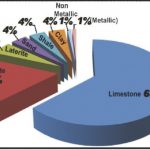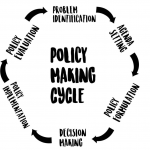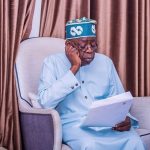World
Chad’s President Idriss Deby Dies Hours After Re-election
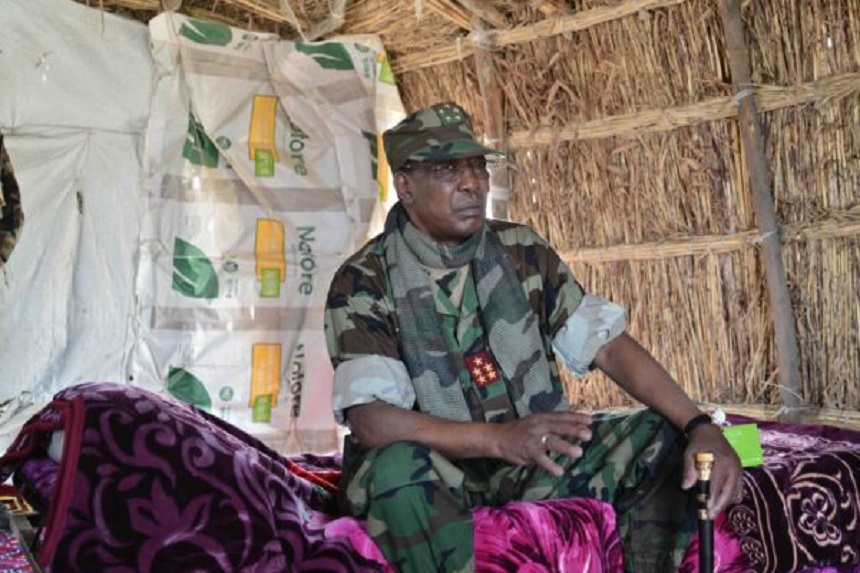
By Adedapo Adesanya
Chad’s President, Mr Idriss Deby, has died of injuries he suffered on the frontline with rebels, the country’s army said on Tuesday.
The country’s leader succumbed to death less than 24 hours after he was elected for a sixth term in office.
According to a spokesman for the West African country’s army, General Azem Bermandoa Agouna, the late President sustained the injuries while commanding his army in fighting against rebels in the north over the weekend.
“The president of the republic, head of state, supreme head of the army, Idriss Déby Itno, has just breathed his last while defending the territorial integrity on the battlefield.
“It is with deep bitterness that we announce to the Chadian people the death this Tuesday, April 20, 2021, of the Marshal of Chad,” Mr Agouna said.
The 68-year-old Deby was projected on Monday to have won the latest presidential election in the country, the provisional results released yesterday showed.
Mr Déby, a career military officer, who seized power in 1990 in a coup, was promoted to the rank of Field Marshal last August.
Ministers and senior officers said on Monday that the head of state had visited the frontline between his army and a column of rebels who had launched an offensive from rear bases in Libya on election day, April 11.
The rebels, whom the army claimed to have defeated in the fighting, had said in a statement that Mr Déby had been wounded, but the information had not been confirmed by official sources.
Conflict in Chad
Chad has been facing various conflicts that caused damages and many deaths. This includes fighting against rebels and also inter-communal conflicts.
Minister of State and Minister Secretary-General of the Presidency of the Republic, Mr Kalzeubé Payimi Deubet, convened members of the government, technical advisers and special advisers of the President to brainstorm on the situation yesterday.
In particular, the deliberations were about the armed clashes between the rebels of the Front for Alternation and Concord in Chad (FACT) against the defence and security forces.
They also looked into inter-community violence in the province of Salamat.
Mr Deubet indicated that: “the real beating inflicted on the terrorists by the brave soldiers of the Chadian national army, the inter-community conflicts in Salamat and the mastery of communication in times of crisis are among others, the main points developed.“
He urged members of the government to “run the administration as it should and not give in to the sirens of disinformation.”
Regarding intercommunal violence in Salamat, he reassured that the situation is on the way to being brought under control.
“The perpetrators, co-perpetrators and accomplices will answer for their acts in court.”
World
Trump’s Tariffs, Russia and Africa Trade Cooperation in Emerging Multipolar World
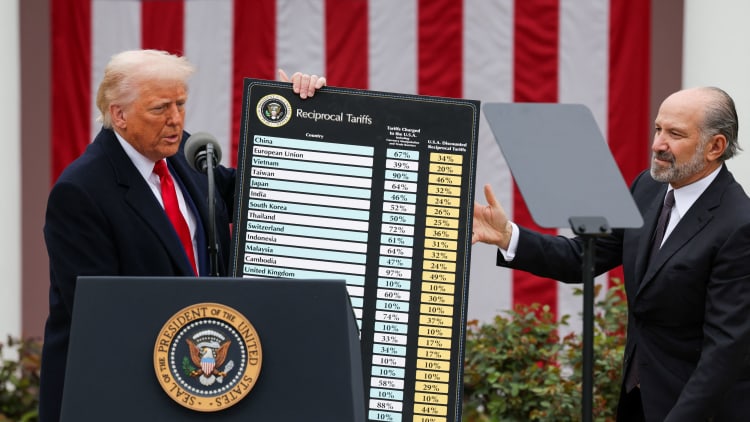
By Kestér Kenn Klomegâh
With geopolitical situation heightening, trade wars are also becoming increasingly prominent. The 47th United States President Donald Trump has introduced trade tariffs, splashed it over the world. China, an Asian trade giant and an emerging economic superpower, has its highest shared.
South Africa, struggling with its fragile foreign alliances, is seriously navigating the new United States economic policy and trade measures, at least to maintain its membership in the African Growth and Opportunities Act (AGOA) which is going to expire in September 2025.
It is a well-known fact that AGOA waived duties on most commodities from Africa in order to boost trade in American market. The AGOA also offers many African countries trade preferences in the American market, earning huge revenues for their budgets. Financial remittances back to Africa also play mighty roles across the continent from the United States.
That however, the shifting geopolitical situation combined with Trump’s new trade policies and Russia’s rising interest in Africa, the overarching message for African leaders and business corporate executives is to review the level of degree how to appreciably approach and strengthen trade partnership between Africa and Russia.
The notion of a new global order and frequently phrased multipolar world, indicating the construction of a fairer architecture of interaction, in practical terms, has become like a relic and just as a monumental pillar. Even as we watch the full-blown recalibration of power, the geopolitical reshuffling undoubtedly creates the conditions for new forms of cooperation.
In this current era of contradictions and complexities we are witnessing today, we must rather reshape and redefine rules and regulations to facilitate bilateral and multilateral relations between African countries and Russia, if really Russia seeks to forge post-Soviet strategic economic cooperation with Africa.
In fact, post-Soviet in the sense that trade is not concentrate on state-to-state but also private – including, at least, medium scale businesses. The new policy dealing with realities of the geopolitical world, distinctively different from Soviet-era slogans and rhetorics of ‘international friendship and solidarity’ of those days.
Bridging Africa and Russia, at least in the literal sense of the word, necessitates partial departure from theoretical approach to implementing several bilateral and multilateral decisions, better still agreements reached at previous summits and conferences during the past decade.
Understandably Africa has a stage, Russia termed ‘the struggle against neo-colonial tendencies’ and mounting the metal walls against the ‘scrambling of resources’ across Africa. Some experts argued that Africa, at the current stage, has to develop its regions, modernize most the post-independence-era industries to produce exportable goods, not only for domestic consumption. Now the emphasis is on pushing for prospects of a single continental market, the African Continental Free Trade Agreement (AfCFTA).
This initiative, however, must be strategically and well-coordinated well, and here I suggest integration and cooperation starting at country-wide basis to regional level before it broadly goes to the entire continent, consisting 54 independent states.
These are coordinated together as African Union (AU), which in January 2021 initiated the African Continental Free Trade Agreement (AfCFTA). With this trading goals in mind, Africa as a continent has to integrate, promote trade and economic cooperation, engage in investment and development. In that direction, genuine foreign partners are indiscriminately required, foreign investment capital in essential for collaboration as well as their entrepreneurial skills and technical expertise.
For instance, developing relations with Asian giants such China and India, the European Union and the United States. A number of African countries are shifting to the BRICS orbit, in search for feasible alternative opportunities, for the theatrical trade drama. In the Eurasian region and the former Soviet space, Kazakhstan and Russia stand out, as potential partners, for Africa.
Foreign Affairs Minister Sergey Lavrov has said, at the podium before the staff and students at Moscow State Institute of International Affairs in September, that trade between Russia and Africa would grow further as more and more African partners continued to show interest in having Russians in the economic sectors in Africa. This provides greater competition between the companies from Western countries, China, and Russia. With competition for developing mineral resources in Africa, it is easier and cheaper for African colleagues to choose partners.
As far back in October 2010, Russian Foreign Affairs Ministry posted an official report on its website that traditional products from least developed countries (including Africa) would be exempted from import tariffs. The legislation stipulated that the traditional goods are eligible for preferential customs and tariffs treatment.
Thereafter, Minister Sergey Lavrov has reiterated, in speeches, trade preferences for African exporters, but terribly failed to honour these thunderous promises. Notwithstanding the above granting trade preferences, there prevailing multitude of questions relating to the pathways of improving trade transactions, and removing obstacles including those Soviet-era rules and regulations.
Logistics is another torny hurdle. Further to this, Russian financial institutions can offer credit support that will allow to localize Russian production in Africa’s industrial zones, especially southern and eastern African regions that show some stability and have good investment and business incentives.
In order to operate more effectively, Russians have to risk by investing, recognize the importance of cooperation on key investment issues and to work closely on the challenges and opportunities on the continent. On one hand, analyzing the present landscape of Africa, Russia can export its technology and compete on equal terms with China, India and other prominent players. On the other hand, Russia lacks the competitive advantage in terms of finished industrial (manufactured) products that African consumers obtain from Asian countries such as China, India, Japan and South Korea.
Compared to the United States and Europe, Russia did very little after the Cold War and it is doing little even today in Africa. On 27th–28th July 2023, St Petersburg hosted the second Russia-Africa summit. At the plenary session, President Vladimir Putin underscored the fact that there was, prior to the collapse of the Soviet, there were over 330 large infrastructure and industrial facilities in Africa, but most were lost. Regarding trade, Putin, regrettably, noted Russia’s trade turnover with the African countries increased in 2022 and reached almost US$18 billion, (of course, that was 2022).
Arguably, Russia’s economic presence is invisible across Africa. It currently has insignificant trade statistics. Until the end of the first quarter of 2025, Russia still has a little over $20 billion trade volume with Africa. Statistics on Africa’s trade with foreign countries vary largely.
For example, the total United States two-way trade in Africa has actually fallen off in recent years, to about $60 billion, far eclipsed by the European Union with over $240 billion, and China more than $280 billion, according to a website post by the Brookings Institution.
According to the African Development Bank, Africa’s economy is growing faster than those of any other regions. Nearly half of Africa is now classified as middle income countries, the numbers of Africans living below the poverty line fell to 39 percent as compared to 51 percent in 2023, and around 380 million of Africa’s 1.4 billion people are now earning good incomes – rising consumerism – that makes trade profitable.
Nevertheless, there is great potential, as African leaders and entrepreneurial community are turing to Russia for multifaceted cooperation due to the imperialist approach of the United States and its hegemonic stand triggered over the years, and now with Trump new trade tariffs and Washington’s entire African policy.
China has done its part, Russia has to change and adopt new rules and regulations, pragmatic approach devoid of mere frequent rhetorics. It is important discussing these points, and to shamelessly repeat that both Russia and Africa have to make consistent efforts to look for new ways, practical efforts at removing existing obstacles that have impeded trade over the years.
Sprawling from the Baltic Sea to the Pacific Ocean, Russia is a major great power and has the potential to become a superpower. Russia can regain part of its Soviet-era economic power and political influence in present-day Africa.
Certainly, the expected superpower status has to be attained by practical multifaceted sustainable development and by maintaining an appreciably positive relations with Africa. We have come a long way, especially after the resonating first summit (2019 and high-praised second summit (2023), several bilateral agreements are yet to be implemented. The forthcoming Russia – Africa Partnership summit is slated for 2026, inside Africa and preferably in Addis Ababa, Ethiopia.
Kestér Kenn Klomegâh is a frequent and passionate contributor. During his professional career as a researcher specialising in Russia-Africa policy, which spans nearly two decades, he has been detained and questioned several times by Russian federal security services for reporting facts. Most of his well-resourced articles are reprinted in a number of reputable foreign media.
World
Tariff War Threatens Global Economy, US-China Goods Trade By 80%—WTO DG
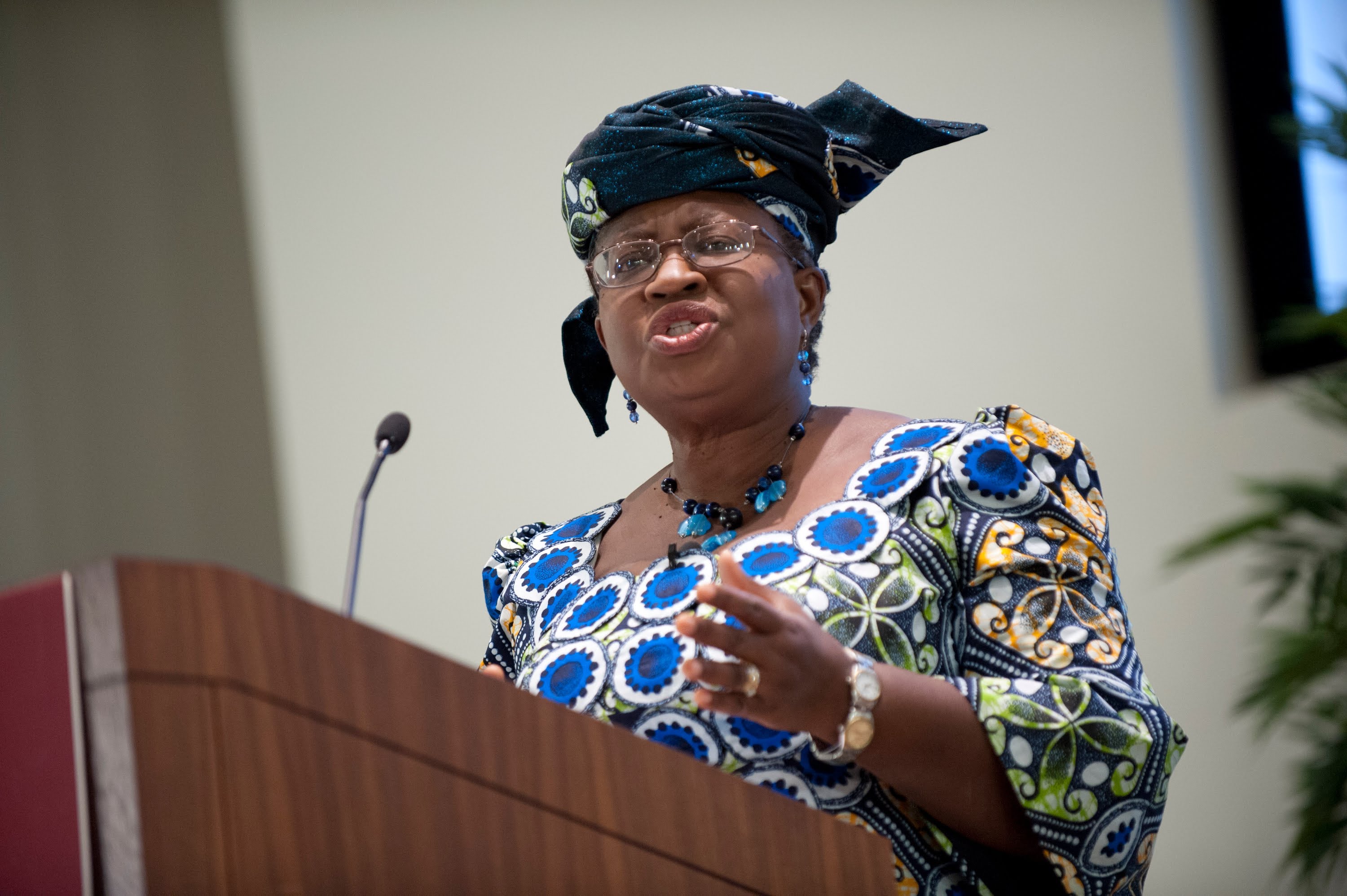
By Adedapo Adesanya
The Director General of the World Trade Organization (WTO), Mrs Ngozi Okonjo-Iweala, has said the US-China tariff war could reduce trade in goods between the two economic giants by 80 per cent and hurt the rest of the world economy.
President Donald Trump raised tariffs on China to 125 per cent on Wednesday as the world’s two largest economies fought over retaliatory levies.
The American President earlier ramped up duties on Chinese goods to 104 per cent, only to hike them further when China retaliated by raising tariffs on US imports to 84 per cent.
In a social media post announcing the moves, President Trump said China had been singled out for special treatment because of “the lack of respect that China has shown to the world’s markets.”
In her reaction to the development, the WTO DG said in a statement that, “The escalating trade tensions between the United States and China pose a significant risk of a sharp contraction in bilateral trade. Our preliminary projections suggest that merchandise trade between these two economies could decrease by as much as 80 per cent.”
She said the United States and China account for three per cent of world trade and warned that the conflict could “severely damage the global economic outlook”.
Even as he slapped further tariffs on China, Mr Trump paused higher tariffs on the rest of the world for 90 days, claiming that dozens of countries reached out for negotiations.
Mrs Okonjo-Iweala warned that the world economy risked breaking into two blocs, one centred around the United States and the other China.
“Of particular concern is the potential fragmentation of global trade along geopolitical lines. A division of the global economy into two blocs could lead to a long-term reduction in global real GDP by nearly seven percent,” she said.
She urged all WTO members “to address this challenge through cooperation and dialogue.”
“It is critical for the global community to work together to preserve the openness of the international trading system.”
“WTO members have agency to protect the open, rules-based trading system. The WTO serves as a vital platform for dialogue. Resolving these issues within a cooperative framework is essential,” she added.
World
AFC Tops $1bn Revenue in 2024 Financial Year

By Adedapo Adesanya
Africa Finance Corporation (AFC), the continent’s top infrastructure solutions provider, has announced its strongest financial performance to date, with total revenue for the year ended December 31, 2024 surpassing $ 1 billion for the first time in its history.
This record performance marks a significant milestone in AFC’s mission to close Africa’s infrastructure gap through scalable, de-risked investments that attract global capital and deliver tangible development outcomes.
The corporation posted a 22.8 per cent increase in total revenue to US$1.1 billion and a 22.3 per cent rise in total comprehensive income to $400 million, up from $327 million in 2023.
AFC’s earnings growth was driven by improved asset yields, prudent cost-of-funds management and sustained traction in advisory mandates.
Further significant financial highlights include net interest income up 42.5 per cent to $ 613.6 million; fee and commission income rose to $109 million, the highest in over five years; operating income climbed 42.7 per cent to $709.7 million; total assets reached a record $14.4 billion, a 16.7 per cent year-on-year increase; liquidity coverage ratio strengthened to 194 per cent, providing over 34 months of cover; and cost-to-income ratio improved to 17.3 per cent from 19.6 per cent in 2023.
According to a statement, AFC said throughout 2024 it continued to scale its impact by mobilising capital for landmark projects across energy, transport, and natural resources.
These included the Lobito Corridor – a cross-border railway development spanning Angola, the Democratic Republic of Congo (DRC), and Zambia. AFC led the initiative to secure a concession agreement within one year of the initial Memorandum of Understanding (MoU), an unprecedented achievement for a project of its scale. In the DRC, AFC also invested $150 million in the Kamoa-Kakula Copper Complex, Africa’s largest copper producer and one of the most sustainable globally, thanks to its high-grade ore and renewable-powered smelter.
Other milestones transactions included financing support for the commissioning of the Dangote Refinery, the largest in Africa, and continued progress on AFC-backed Infinity Power Holding’s 10 GW clean energy ambition, with power purchase agreements secured in Egypt and South Africa.
AFC also invested in the 15GW Xlinks Morocco-UK Power Project, providing $14.1 million to support early-stage development of a transcontinental renewable energy pipeline between North Africa and Europe.
AFC strengthened its capital base and expanded its investor network through several landmark funding initiatives. These included a $ 1.16 billion syndicated loan – the largest in its history, a $500 million perpetual hybrid bond issue, and the successful execution of Nigeria’s first-ever domestic dollar bond, which raised $900 million at 180 per cent oversubscription.
AFC also returned to the Islamic finance market after eight years, closing a $400 million Shariah-compliant facility.
The year also saw strong momentum in equity mobilisation, with $181.8 million in new capital raised from ten institutional investors. These included Turk Eximbank – AFC’s first non-African sovereign shareholder – the Arab Bank for Economic Development in Africa (BADEA), and several major pension funds spanning Cameroon, Seychelles, Mauritius, and South Africa. Ratings agencies affirmed AFC’s robust credit profile, with AAA ratings from S&P Global (China) and China Chengxin International, and a stable A3 Outlook from Moody’s.
Speaking on the result, Ms Samaila Zubairu, President & CEO of AFC said, “These results send a clear message that strategic investment in African infrastructure creates lasting value for both beneficiaries and investors.”
“In 2024, we exceeded the billion-dollar revenue mark, delivered game-changing projects, and reinforced our financial resilience—demonstrating the scalability of our unique model that blends purpose with performance to accelerate Africa’s economic transformation,” she added.
-

 Feature/OPED5 years ago
Feature/OPED5 years agoDavos was Different this year
-
Travel/Tourism9 years ago
Lagos Seals Western Lodge Hotel In Ikorodu
-

 Showbiz2 years ago
Showbiz2 years agoEstranged Lover Releases Videos of Empress Njamah Bathing
-

 Banking7 years ago
Banking7 years agoSort Codes of GTBank Branches in Nigeria
-

 Economy2 years ago
Economy2 years agoSubsidy Removal: CNG at N130 Per Litre Cheaper Than Petrol—IPMAN
-

 Banking2 years ago
Banking2 years agoFirst Bank Announces Planned Downtime
-

 Sports2 years ago
Sports2 years agoHighest Paid Nigerian Footballer – How Much Do Nigerian Footballers Earn
-

 Technology4 years ago
Technology4 years agoHow To Link Your MTN, Airtel, Glo, 9mobile Lines to NIN






